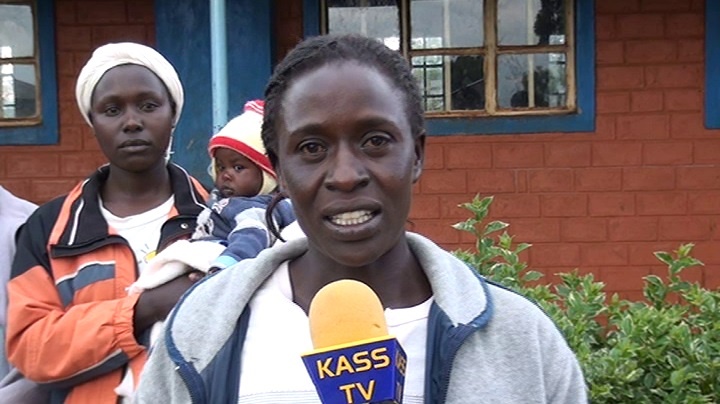Reformed illegal brewers embrace alternative sources of livelihood

Anita Kirui a former brewer addressing the press at Eldoret. She has been brewing at least 50 liters of chang’aa each day for the last 9 years.Picture by Wilson Rotich.
Forty-six out of 200 incorrigible brewers of illicit alcoholic drinks in Egeiyo Marakwet County have graduated into constructive businesses in the society following the presidential directive to ban all illicit drinks.
Ninety per cent of brewers in the county are women who get into the business as the last option, at least as they see it. Most of them are young mothers who get into marriage because of circumstances that include teenage pregnancies and illiteracy.
Joiyce Biwott, 28, was one of them. She said she delved into the drains in 2004 as soon as she got married. She realized that her husband and herself were both unemployed and had no source of income for their daily bread.
Just like any other responsible mother and spouse Ms Biwott settled on brewing chang’aa as the only way out of poverty. Little did she know that she had begun the vicious rat race.
She was able to escape the long hand of the law for close to a decade. However, the law caught up with her when the government impressed upon the provincial administration to stamp out the vice in their areas of jurisdiction within a period of three months.
Ms Biwott said when the chiefs and the police started the crackdown, her business crumbled exposing her to huge debts and poverty. This drove her to the rehabilitation center.
Gladys Kangogo is another beneficiary of the rehabilitation program who now keeps poultry. She said she began the business of brewing the illicit brew in 2007 in a bid to make ends meet with her spouse. The mother of five confessed that she used to brew 100 liters of the alcoholic drink every day.
Within two years Ms Kangogo rose to become an employer of sorts. “I had employed several young men to prepare the drinks. I would pay them each about Ksh100 at the end of the day. Most of them drank the whole amount in my home and went home empty handed. I feel that I messed up with the lives of those young men and women,” she regretted.
However, she says she is determined to undo the damage as much as possible urging her former customers to abstain from drinking and embark on positive development activities like farming.
Anita Kurui, 33, has been brewing at least 50 liters of chang’aa for the last nine years. She said she learnt the trade as a quicker way of getting out of abject poverty. “We had nothing in our home. My husband did not have a single cow, not even a goat or chicken,” she said.
Ms Kurui confessed that she would sell her drinks indiscriminately. “I needed money so badly that I even sold the alcoholic drinks to underage school students who could afford to buy,” she said.
Just like the other young women she was so industrious in her brewing business that she could work the entire night and even at the weekends. She has since reinvested her energy in dairy farming.
Moses Limo,50, was a veteran illicit brewer who had been serving residents of Chepkorio in Elgeiyo-Marakwet for the last 28 years.
“I began distilling chang’aa and making busaa in 1985 when my first born child was a teenager. I now have six grown up children. The Jubilee government has made it impossible for me to continue this business,” Limo said.
He said he was both a drunkard and a brewer. But he has since obeyed the turning tides and joined the Komong’u Self Help Group which literally means an exodus out of alcoholism to development. The group comprises 46 members who were previously illicit brewers but have been fully rehabilitated.
The group was taken to the Ukweli Training Center in Eldoret town by four chiefs led by Luka Kiptoo of Samich Location in Chepkorio Division in the county.
The proprietor of Ukweli Training Center that rehabilitated them, Mr Samuel Teimuge, said the institution has equipped them with various vocational skills that include poultry keeping, bee keeping, dairy farming, horticultural farming and entrepreneurship.
“These men and women brewed and marketed the illegal stuff, chang’aa and busaa with passion, energy and creativity. All we have done here is to redirect their energy and passion to legal and constructive businesses,” he said.
According to the National Survey on Alcohol and Drug Abuse conducted by NACADA in 2012 more than 13 per cent of Kenyans consume alcohol.
“Taditional liquor is the most easily accessible and abused type of alcohol followed by wines and spirits. Thirty per cent of Kenyans aged 15-65 have ever consumed alcohol in their life time,” said the survey.
A couple of months ago President Uhuru Kenyatta spearheaded a countrywide war on illicit brew and warned the County Commissioners and other administrators who failed to eradicate illegal alcohol and drug abuse in their counties risked being rendered redundant.

